Harvesting the Killing Fields
The proposal to see God at work in Neak Loeung, Cambodia seemed exciting enough despite misgivings about so-called "short-term missions", strong convictions about such Christian tourism and thinking that perhaps the local missionaries might make better use of our airfare. (The ironic tyranny of current NGO-Think!)
Still, unlike the solo backpacking trip undertaken a decade ago to satiate personal wanderlust and curiosity about the world, the aim of this team visit was to encourage a couple in the field and explore the possibility of a long-term partnership with Simon and Angeline Porter (a "vision trip", it seems, in the missionary-speak!).
And unlike the previous excursion when one arrived at Phnom Penh only with scraps gleaned from a quick flip of an old Lonely Planet guide, there was enough now information online to indulge in what might sometimes be the sinful urge to decently plan ahead.
The Porters lived along National Highway 11 in Neak Leung (or Neak Loeung or Neak Loeang), south-east of Phnom Penh. Checked it out on satellite here and here.
Used wego.com to check for the lowest fare to Phnom Penh.
Checked-in online for the Silkair flight there.
Checked the seat guide for the Jetstar flight back.
Checked out what to expect upon arrival at Pochentong International Airport.
Checked visa requirements.
Determined if there were any "extra charges".
Was made to understand that the days of the Neak Loeung ferries (and its mobile hawkers) were numbered by the imminent arrival of a Japanese-funded bridge.
To know what to pack, checked local customs and weather.
To know what to pray about, checked out how the harvest was doing and the harvesting songs.
Then of course, to be sure that we would not be the main course on anyone's dinner menu, the Porters' blog! And here, Spangecake Productions shows them preparing to go to Cambodia together.
All planned, sorted and under control then.
But the humbling came quick and fast when it became obvious that despite oceans of information at our fingertips, we had no awareness of/control over our sinful self-centredness.
First, there was the imposition on our hosts - their having to get our rooms ready, top up the water tank (running water being non-existent) and the portable water (tap water being undrinkable), answer to our whims, have us gobble more than our fair share of food, bring us around for meals, tolerate us being far to concerned with babbling at their sweet-tempered baby to bother to make proper edifying conversation and gently prevent us from doing too much damage to their sheep.
Thankfully, they had Mai who, in addition to being a great house help, also cooked a fantastic vegetable kari for our first dinner and then spicy beef stew for a lunch.
And the Chos hosted us on the last night with an absolutely delicious Korean spread.
Second, the curse (or grace?) of Babel frustratingly prevented us from understanding the hours of goings-on at Sunday service at the Fellowship Church of Neak Loeung and the village children's event and the bible study/sharing that followed and having any meaningful or sustained conversations.
Still, we managed to possibly insult the lead teacher at the kindergarten in front of his colleagues and demonstrated fatal hubristic assurance of the superiority of our knowledge in childhood education.
But we should have learned:
1. To be considered about giving. Christian tourists like to roll up at an impoverished village and hand out money, clothes, towels, goodies (and then take photos with the cutest kids). Far from being a loving act, this pietistic consumerism encourages the local people to adopt a begging mentality and a dependency on foreign donations.
2. Not to give out sweets to children - dental hygiene may be lacking and all that sugar content will contribute to a deterioration in dental health.
3. That while teaching English and medical work may be useful for the community, the benefits of these in the here-and-now distract from the main aim which is to teach the gospel and thus save souls in the certain future. The karma-centric worldview of the common man meant a lack of interest in alleviating suffering and a disinterest in lives, especially if those living beings were children. Hot on the heels of acceptance of the gospel and the understanding that even the littlest, most insignificant humans are valuable because they are made in the image of God, will surely be social action and care for the community. The Korean missionaries who'd been in the field for 11 years warned, then, of putting the cart before the horse.
4. OMF's Indigenous Biblical Church Movement policy is a well-thought out and other person-centred strategy worth considering. It works to encourage sustainable growth with churches that use the local language and customs, and are led by local people who take responsibility for their funding, thinking and planning. There is emphasis on the use of methods and resources that are easily reproducible by the local people; otherwise, as is the case in Cambodia, the local people lack the confidence to do anything because each visiting group brandishes sure-win flashy material and snazzy booklets that they could not hope to emulate in the near future.
(However, as Cambodia ascends the developmental chart, its people are eager to embrace all that is Western as a symbol of progress. Hillsongs is apparently quite popular though there has yet to be the sort of mishearing of lyrics apparently prevalent in the Philippines, viz, "All-Whitey God", "Magic Tree, worship his Magic Tree...Uncle Jesus be all glory power and praise...")
5. That just as it is in our home churches, so it is in a foreign "mission field" that church life should be focused on the Bible as the ultimate authority for Christian living. We are to help people understand it for themselves. God's word, not the foreign missionary from a developed country, should be the basis of confidence for faith, evangelism, decision-making, life etc.
The good news is not a western gospel that needs to be contextualised but a gospel that speaks to all contexts - western and eastern, developed and developing.
6. Not to impose our imported methodologies or processes on the local church but rather to speak with local leaders about their reasons for conducting ministry or other matters in a certain way. Most likely, this is what they have found, through their own trial and error and in their understanding of their own people, works best.
7. While learning the vernacular and the local culture is necessary, there needs to be a balance between complete assimilation and sustainability of ministry.
(Having been the last of three sizeable adults squashed on a moto and constantly in danger of being bumped off at the next pothole and/or having my spine irreparably compressed, the dangers of acquiring incapacitating back problems in the name of living like the locals were obvious; but a car, however rundown and mozzie-filled, would set their owners a class apart... As would wearing shoes, or having a liking for tender chicken (an apparently expensive meat in these parts).)
8. All this requires a long-term commitment to live in community with the locals and to love them, not just to fly in for visits every now and then.
But it was wonderful to hear how God brought each person we met into relationship with him, through friends, talks, randomly reading the Bible. And in the brotherhood of God's children, our struggles against sin are similar, though amplified. Coming to meet with God's family on Sundays may be trying for pasty yuppies who want a sleep-in after a hard week but for many Cambodians in Neak Luoeng, such trials are amplified: it is about choosing to give up working on the most lucrative day of the week and making a serious dent in household income or about having enough fuel for the moto to get to church.
And in a country where public school (not necessarily the one pictured above) teachers are known to teach only half the syllabus and then demand more money to hand over the other half necessary for exams, choosing not to participate in the corruption could have a great impact on a Christian student's ability to move out of the poverty cycle through education.
There is no more romance in being a missionary in an exotic land (even though there are experiences to write home about - the heat that necessitates a siesta after lunch, mozzies at every turn, centipedes underfoot, cockroaches in the sink in the morning, mice in the rice cooker, pythons and cobras on church grounds, frogs in the toilet and bats in the attic) than there is being a missionary in one's homeland. Giving up one's comforts (and indeed, one's life) daily, thinking about how best to present the gospel in any given context, persevering, loving and caring for people for the long-term is what the home and overseas missionary must be concerned with, for that is our work and our calling as those who are imitators of Christ. Though the sweaty, bite-laden evangelist might find it physically and practically more difficult to slip into a complacent stupor in a comfortable neighbourhood.
Lots more to think through, but if we feel for the unknown victims of Pol Pot's Khmer Rouge, should we not then be desperate for the salvation of those around us? For there is a day that will be more horrible (and yet just) for the unrepentant than the atrocities at Tuol Sleng and we might already know some of the mug-shots that will be on that wall.
Still, unlike the solo backpacking trip undertaken a decade ago to satiate personal wanderlust and curiosity about the world, the aim of this team visit was to encourage a couple in the field and explore the possibility of a long-term partnership with Simon and Angeline Porter (a "vision trip", it seems, in the missionary-speak!).
And unlike the previous excursion when one arrived at Phnom Penh only with scraps gleaned from a quick flip of an old Lonely Planet guide, there was enough now information online to indulge in what might sometimes be the sinful urge to decently plan ahead.
The Porters lived along National Highway 11 in Neak Leung (or Neak Loeung or Neak Loeang), south-east of Phnom Penh. Checked it out on satellite here and here.
Used wego.com to check for the lowest fare to Phnom Penh.
Checked-in online for the Silkair flight there.
Checked the seat guide for the Jetstar flight back.
Checked out what to expect upon arrival at Pochentong International Airport.
Checked visa requirements.
Determined if there were any "extra charges".
Was made to understand that the days of the Neak Loeung ferries (and its mobile hawkers) were numbered by the imminent arrival of a Japanese-funded bridge.
To know what to pack, checked local customs and weather.
To know what to pray about, checked out how the harvest was doing and the harvesting songs.
Then of course, to be sure that we would not be the main course on anyone's dinner menu, the Porters' blog! And here, Spangecake Productions shows them preparing to go to Cambodia together.
All planned, sorted and under control then.
But the humbling came quick and fast when it became obvious that despite oceans of information at our fingertips, we had no awareness of/control over our sinful self-centredness.
First, there was the imposition on our hosts - their having to get our rooms ready, top up the water tank (running water being non-existent) and the portable water (tap water being undrinkable), answer to our whims, have us gobble more than our fair share of food, bring us around for meals, tolerate us being far to concerned with babbling at their sweet-tempered baby to bother to make proper edifying conversation and gently prevent us from doing too much damage to their sheep.
Thankfully, they had Mai who, in addition to being a great house help, also cooked a fantastic vegetable kari for our first dinner and then spicy beef stew for a lunch.
And the Chos hosted us on the last night with an absolutely delicious Korean spread.
Second, the curse (or grace?) of Babel frustratingly prevented us from understanding the hours of goings-on at Sunday service at the Fellowship Church of Neak Loeung and the village children's event and the bible study/sharing that followed and having any meaningful or sustained conversations.
Still, we managed to possibly insult the lead teacher at the kindergarten in front of his colleagues and demonstrated fatal hubristic assurance of the superiority of our knowledge in childhood education.
But we should have learned:
1. To be considered about giving. Christian tourists like to roll up at an impoverished village and hand out money, clothes, towels, goodies (and then take photos with the cutest kids). Far from being a loving act, this pietistic consumerism encourages the local people to adopt a begging mentality and a dependency on foreign donations.
2. Not to give out sweets to children - dental hygiene may be lacking and all that sugar content will contribute to a deterioration in dental health.
3. That while teaching English and medical work may be useful for the community, the benefits of these in the here-and-now distract from the main aim which is to teach the gospel and thus save souls in the certain future. The karma-centric worldview of the common man meant a lack of interest in alleviating suffering and a disinterest in lives, especially if those living beings were children. Hot on the heels of acceptance of the gospel and the understanding that even the littlest, most insignificant humans are valuable because they are made in the image of God, will surely be social action and care for the community. The Korean missionaries who'd been in the field for 11 years warned, then, of putting the cart before the horse.
4. OMF's Indigenous Biblical Church Movement policy is a well-thought out and other person-centred strategy worth considering. It works to encourage sustainable growth with churches that use the local language and customs, and are led by local people who take responsibility for their funding, thinking and planning. There is emphasis on the use of methods and resources that are easily reproducible by the local people; otherwise, as is the case in Cambodia, the local people lack the confidence to do anything because each visiting group brandishes sure-win flashy material and snazzy booklets that they could not hope to emulate in the near future.
(However, as Cambodia ascends the developmental chart, its people are eager to embrace all that is Western as a symbol of progress. Hillsongs is apparently quite popular though there has yet to be the sort of mishearing of lyrics apparently prevalent in the Philippines, viz, "All-Whitey God", "Magic Tree, worship his Magic Tree...Uncle Jesus be all glory power and praise...")
5. That just as it is in our home churches, so it is in a foreign "mission field" that church life should be focused on the Bible as the ultimate authority for Christian living. We are to help people understand it for themselves. God's word, not the foreign missionary from a developed country, should be the basis of confidence for faith, evangelism, decision-making, life etc.
The good news is not a western gospel that needs to be contextualised but a gospel that speaks to all contexts - western and eastern, developed and developing.
6. Not to impose our imported methodologies or processes on the local church but rather to speak with local leaders about their reasons for conducting ministry or other matters in a certain way. Most likely, this is what they have found, through their own trial and error and in their understanding of their own people, works best.
7. While learning the vernacular and the local culture is necessary, there needs to be a balance between complete assimilation and sustainability of ministry.
(Having been the last of three sizeable adults squashed on a moto and constantly in danger of being bumped off at the next pothole and/or having my spine irreparably compressed, the dangers of acquiring incapacitating back problems in the name of living like the locals were obvious; but a car, however rundown and mozzie-filled, would set their owners a class apart... As would wearing shoes, or having a liking for tender chicken (an apparently expensive meat in these parts).)
8. All this requires a long-term commitment to live in community with the locals and to love them, not just to fly in for visits every now and then.
But it was wonderful to hear how God brought each person we met into relationship with him, through friends, talks, randomly reading the Bible. And in the brotherhood of God's children, our struggles against sin are similar, though amplified. Coming to meet with God's family on Sundays may be trying for pasty yuppies who want a sleep-in after a hard week but for many Cambodians in Neak Luoeng, such trials are amplified: it is about choosing to give up working on the most lucrative day of the week and making a serious dent in household income or about having enough fuel for the moto to get to church.
And in a country where public school (not necessarily the one pictured above) teachers are known to teach only half the syllabus and then demand more money to hand over the other half necessary for exams, choosing not to participate in the corruption could have a great impact on a Christian student's ability to move out of the poverty cycle through education.
There is no more romance in being a missionary in an exotic land (even though there are experiences to write home about - the heat that necessitates a siesta after lunch, mozzies at every turn, centipedes underfoot, cockroaches in the sink in the morning, mice in the rice cooker, pythons and cobras on church grounds, frogs in the toilet and bats in the attic) than there is being a missionary in one's homeland. Giving up one's comforts (and indeed, one's life) daily, thinking about how best to present the gospel in any given context, persevering, loving and caring for people for the long-term is what the home and overseas missionary must be concerned with, for that is our work and our calling as those who are imitators of Christ. Though the sweaty, bite-laden evangelist might find it physically and practically more difficult to slip into a complacent stupor in a comfortable neighbourhood.
Lots more to think through, but if we feel for the unknown victims of Pol Pot's Khmer Rouge, should we not then be desperate for the salvation of those around us? For there is a day that will be more horrible (and yet just) for the unrepentant than the atrocities at Tuol Sleng and we might already know some of the mug-shots that will be on that wall.
Labels: Travels: Cambodia

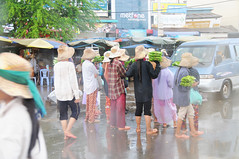
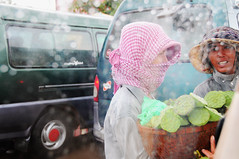
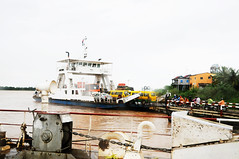
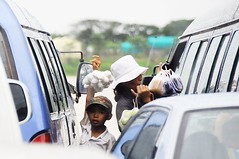
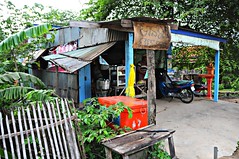
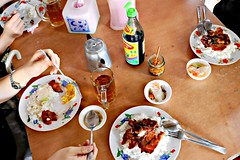
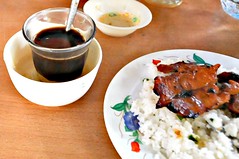
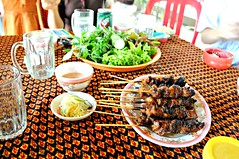
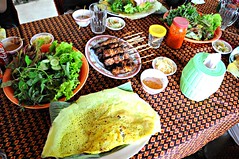
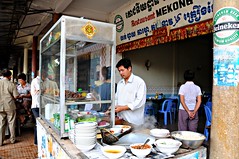
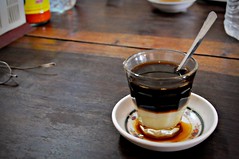
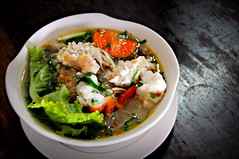
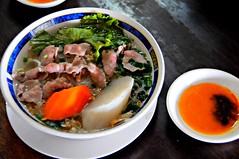
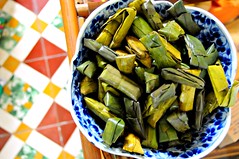
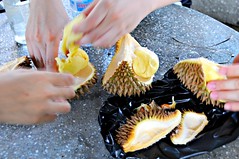
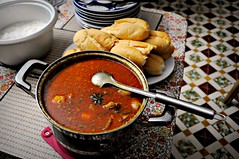
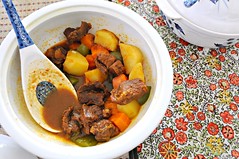
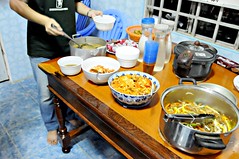
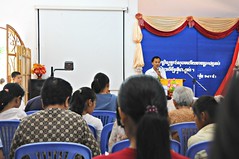
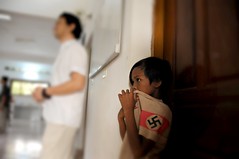
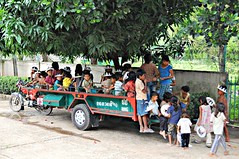
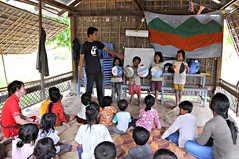
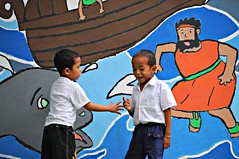
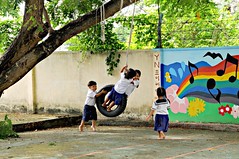
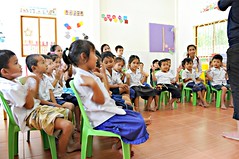
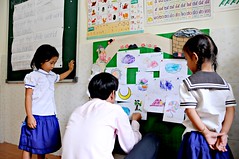
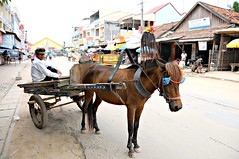

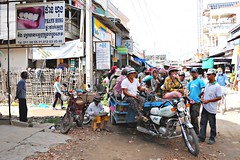
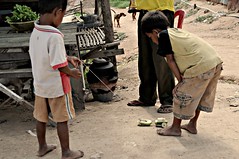
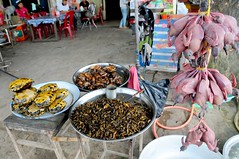
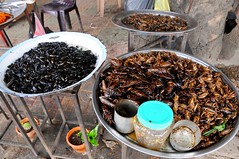
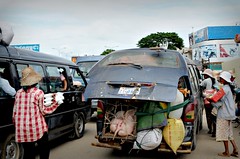
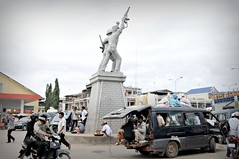
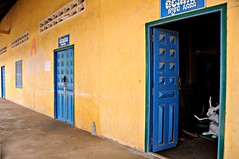
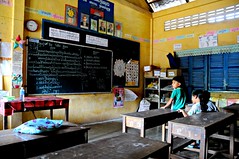
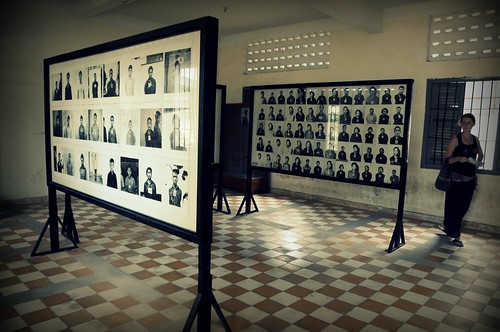







2 Comments:
hi, did you go with OMF? can i share this blog entry with 2 teams (one OMF and one CMS team) that i know going to cambodia (from brisbane) later this year? :)
thanks for sharing your thoughts and experience.
Hi island, sure! if it will be of any help.
We went on our own but were hosted by extremely nice and patient OMF missionaries.
Post a Comment
Subscribe to Post Comments [Atom]
<< Home